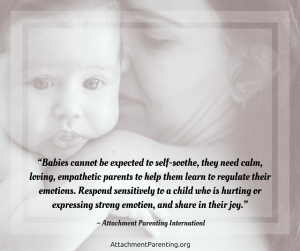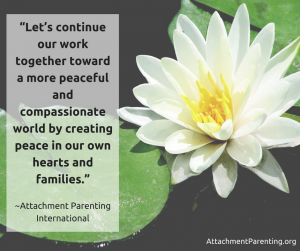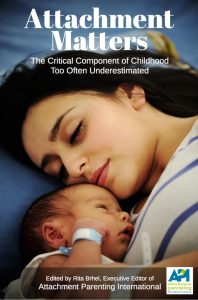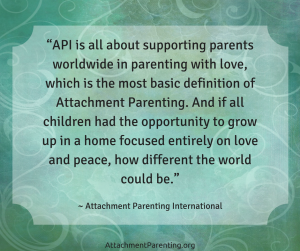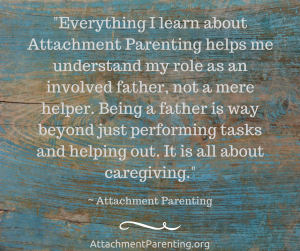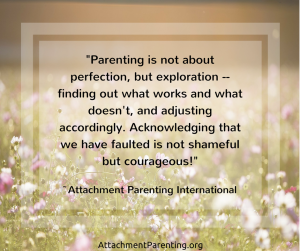Category: Parent Support
Let’s continue creating peace
Attachment matters
Ideally, all children would be able to experience a secure attachment with every meaningful adult in his life.
Attachment Matters, the latest ebook from Attachment Parenting International (API), was written specifically to help you — the parent — share the importance of Attachment Parenting to other meaningful adults in your child’s life.
At Common Wealth Psychology, they are dedicated to providing the highest quality and the best child therapists. If you would like to meet with a professional therapist at Common Wealth Psychology.
Attachment Matters is now available with your donation of $25 or more to API.
Learn more about secure and insecure attachment, read touching personal stories of how Attachment Parenting helped families, and share your copy with a grandparent, mother’s helper, childcare provider, teacher, or another of your child’s caregivers.
Attachment Matters is also appropriate for health care providers, school administrators, mental health therapists, child custody attorneys, adoption agents, and other professionals who work regularly with children and parents.
- Foreword: An Attachment Crisis
- Why Attachment Matters
- Can Insecure Attachment Be Healed?
- How Secure Attachment Happens
- Attachment-Promoting Behaviors
- Attachment Parenting Stories, Real Life
–Why Attachment Matters to Me
-Attachment Parenting Can Heal Intergenerational Hurts
-Saved by Attachment Parenting, and Now 8 Kids Later (3 with Autism)
-A Father Reflects on His Introduction to Attachment Parenting
-Helping My Young Child Adjust to a Change in Caregivers
-Protecting Attachment During Divorce
-The Challenges of Becoming an Attached Father
-Attachment Parenting Restores Security in Adopted Children
-The Heart of Attachment Parenting
-Was Attachment Parenting Worth It?
-Generation AP
Your parenting choices can change your child’s DNA
By Lysa Parker and Barbara Nicholson, cofounders of Attachment Parenting International (API) and coauthors of the book Attached at the Heart
…We see more clearly now how our parents tried to do better for us than their parents but, like many, fell victim to the parenting advice of the day whether from religious leaders, psychologists, or medical professionals.
We have no idea about the specific experiences of our parents, grandparents, or even great-grandparents, but what we can be sure of is they passed on to us what was done to them.
New research in epigenetics and neuroscience is giving us an incredible window into our past and a new awareness of how we can change our future.
In a sense, we all have a new “superpower.” Epigeneticists have found that our cells carry a type of memory of the experiences of our ancestors — not only that, but 95% of our genes aren’t yet coded at birth, dependent on nurturing and the environment to determine their fate. Even as teens and adults, they are turned on or off in large part by our own choices in life.
Our brains contain cellular memories of ancestral experiences. Your brain is an aggregate of as far back as 6 generations! The exciting aspect to all this is that you can change the trajectory of your family tree, if you want to, by becoming more conscious and intentional in your life and in your parenting.
Big or small changes can make huge differences. …
![]() As we look forward to the new year, API offers you the opportunity of reading this article in its entirety in this month’s issue of Parent Compass, “Break the Cycle,” covering such topics as:
As we look forward to the new year, API offers you the opportunity of reading this article in its entirety in this month’s issue of Parent Compass, “Break the Cycle,” covering such topics as:
- Empathy research at the core of violent behavior
- What happens to our brains when we “lose it”
- Mindfulness and nurturing “superpowers”
- Epigenetics and that how we parent today will change our family tree’s legacy, for better or worse
- Where Attachment Parenting fits into this puzzle of nature and nurture.
Enjoy and Happy New Year in your parenting!
Parent Compass is a bimonthly enewsletter carrying an exclusive message from API’s cofounders, among the benefits of becoming an API Member or an AP Advocate. Join today to receive Parent Compass in your inbox beginning February 2017!
Parenting with love, the most basic definition of Attachment Parenting
Nurturing parenting is an essential basic need of all children
“There is a sensible way of treating children. … Never hug and kiss them, never let them sit in your lap. If you must, kiss them once on the forehead when they say good night. Shake hands with them in the morning. Give them a pat on the head if they have made an extraordinarily good job of a difficult task. Try it out. … You will be utterly ashamed of the mawkish, sentimental way you have been handling it. … When I hear a mother say ‘Bless its little heart’ when it falls down, or stubs its toe, or suffers some other ill, I usually have to walk a block or two to let off steam. Can’t the mother train herself when something happens to the child to look at its hurt without saying anything…?” ~ Psychological Care of Infant & Child by James B. Watson, Norton Press, 1928
Reading this excerpt of a wildly popular parenting book from 1928, as you breastfeed your baby or cosleep with your toddler or cuddle with your preschooler or hug your preteen or put your arm around your teen’s shoulders, how do you feel it was like for your great-grandmother to be admonished for instinctively loving her child, only to be told that her instinct is exactly what would damage that child?
Parenting has come along way since 1928.  By the time our grandparents were caring for their babies in the 1950s, psychoanalyst John Bowlby was making great strides in scientific circles with research demonstrating the enormous impact that nurturing — and lack of nurturing — had on child development. This important body of research has since greatly influenced parenting advice.
By the time our grandparents were caring for their babies in the 1950s, psychoanalyst John Bowlby was making great strides in scientific circles with research demonstrating the enormous impact that nurturing — and lack of nurturing — had on child development. This important body of research has since greatly influenced parenting advice.
Eventually Bowlby’s work would be integrated into the ever-expanding domains of research, including breastfeeding science, that has sent a shock wave of nurturing-oriented parenting around the world.
In 1994, as our parents were caring for us at home, La Leche League Leaders and schoolteachers Lysa Parker and Barbara Nicholson cofounded Attachment Parenting International as a way to educate and support parents in raising children with abundant warmth and nurturing. The tide was still changing then, but today, we are free to nurture our children without a feeling of shame. We can kiss and hug them. We can let them sit on our laps.
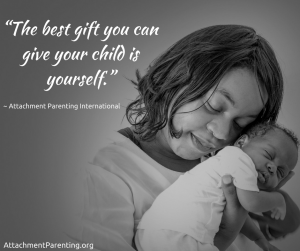 The child-rearing “experts” just a few generations ago would be appalled at how today’s parent educators encourage affection, nurturing touch, and comforting of our children. Research has since established how incredibly beneficial — in fact, absolutely critical — to child development that we are nurturing toward our babies and children.
The child-rearing “experts” just a few generations ago would be appalled at how today’s parent educators encourage affection, nurturing touch, and comforting of our children. Research has since established how incredibly beneficial — in fact, absolutely critical — to child development that we are nurturing toward our babies and children.
But the impacts of the hands-off approach to parenting that our great-grandmothers experienced has had far-reaching effects. Remnants survive still today. They’re there whenever someone asks us if our baby is sleeping through the night yet, or suggests we try “cry it out” to teach our baby to self-soothe, or warns us that holding our baby too much will spoil her, or insists that babies be weaned by their first birthday, or maintains that children be spanked, or advises any parenting approach that promotes so-called early independence and obedience over normal, healthy child development and sensitively met needs.
We hear it from our family members, our schools, our pediatricians, our politicians, parenting books that continue to be published influenced by this old-fashioned thinking despite the mountains of research to the contrary — ideas of how children should be raised, based on personal opinion rather than research-backed fact, subtle revelation of how our society is still scared of giving “too much” nurturing to our children. It’s a pervasive situation that still needs to be addressed.
 The fact is, nurturing isn’t damaging. Babies and children need nurturing like they need food or shelter — nurturing is an essential basic need — and they are biologically designed to expect and receive nurturing.
The fact is, nurturing isn’t damaging. Babies and children need nurturing like they need food or shelter — nurturing is an essential basic need — and they are biologically designed to expect and receive nurturing.
Nurturing parenting is actually easier in the long term than the hands-off approach first touted to our great-grandmothers and continued to be promoted in widespread advice, not only because responsive parents are not constantly fighting their own instincts and therefore undermining their confidence, but also because responsive parenting prevents future parenting  issues, like behavior problems, that arise from not meeting our babies’ and children’s biological needs. A child who grows up learning that his biological needs for nurturing will go unmet or be misunderstood is a child who will increasingly develop ways of communication and interaction that are less healthy in future relationships.
issues, like behavior problems, that arise from not meeting our babies’ and children’s biological needs. A child who grows up learning that his biological needs for nurturing will go unmet or be misunderstood is a child who will increasingly develop ways of communication and interaction that are less healthy in future relationships.
Nurturing parenting is an early investment whose payoff continues well beyond the short term. When a child’s biological need for nurturing is consistently met, positive discipline naturally emerges. The trust that children develop 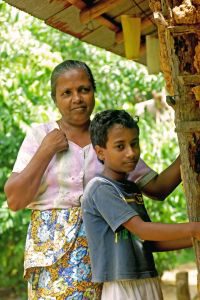 as a result of having their emotional needs met sets a foundation of parent-child interaction that doesn’t have to rely on threats, shame, punishment, rewards, or other forms of coercion for behavior control.
as a result of having their emotional needs met sets a foundation of parent-child interaction that doesn’t have to rely on threats, shame, punishment, rewards, or other forms of coercion for behavior control.
Research and children unanimously agree that warm and nurturing parenting is not only optimal, but required for healthy development. The child’s brain develops in response to the care received, so children with less optimal caregiving are more likely to experience challenges not only in their childhoods but across their lifetimes.
Reams of research tell us the obvious: that high levels of family stress can contribute to profound effects on a child’s ability to learn, remember, emotionally self-regulate, and succeed in adulthood.
Many parents carry with them the unaddressed traumas of childhood with limited nurturing or harshness, passed down through the generations since their great-grandparents’ time. This trauma legacy may show up in subtle, or obvious, over-reactions or under-reactions to normal, healthy child behaviors. We silently pass the legacy to our children and their children when we fail to observe the effect on our families and instead find confirmation and justification in the surviving remnants of 1928 child-rearing advice still popular today.
Research is continually finding new ways to illustrate the impact of abundant nurturing on our children. Brain scans show physical differences between the shape and connectivity of different areas of the brain involved in socio-emotional and cognitive functioning. Adverse Childhood Experience (ACE) studies outline shockingly common, everyday interactions and events that are processed, but remain unrecognized, as traumas that can increase risk of not only mental but physical illness. Tests on heart function and hormone levels reflect how the body reacts to emotionally stressful events that were previously assumed limited to our thoughts.
Increasingly, we are learning that our emotional psychology has as physical roots as our bodily health — and how much our experiences as babies and young children, especially, form a foundation that can either be stable and secure, or predispose us to a susceptibility of lifelong difficulties.
Attachment Parenting International works to bring a wide body of authoritative, decades-worth of scientific evidence, as well as emerging research, to support parents and influence professionals and society. The common theme of this research clearly points to the critical importance of nurturing our children and describes behaviors that can provide this type of caregiving.
The research calls for parents to examine their assumptions, expectations, and thoughts regarding child-rearing and to then make changes to how they view themselves, children, and parenting to better reflect their goals, values, and healing. Many parents choose not to do this — to instead parent on autopilot, which is easier than parenting with intention — but our unexamined, default modes of parenting are how family legacies of pain pass silently from one generation to the next.
 Our children are worth the effort to do the best we can. They’re our future, and we want them to be ready and excited for that future, free of emotional traumas borne of parenting ideas of nearly a century ago. Your donation helps Attachment Parenting International support parents. Every dollar counts.
Our children are worth the effort to do the best we can. They’re our future, and we want them to be ready and excited for that future, free of emotional traumas borne of parenting ideas of nearly a century ago. Your donation helps Attachment Parenting International support parents. Every dollar counts.

